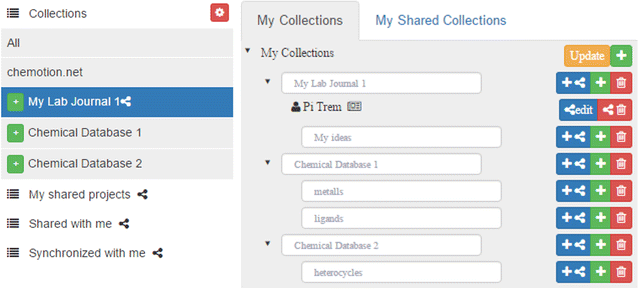Difference between revisions of "Template:Article of the week"
Shawndouglas (talk | contribs) (Updated article of the week text.) |
Shawndouglas (talk | contribs) (Updated article of the week text.) |
||
| Line 1: | Line 1: | ||
<div style="float: left; margin: 0.5em 0.9em 0.4em 0em;">[[File: | <div style="float: left; margin: 0.5em 0.9em 0.4em 0em;">[[File:Fig2 Tremouilhac JOfChemoinfo2017 9.gif|240px]]</div> | ||
'''"[[Journal: | '''"[[Journal:Chemotion ELN: An open-source electronic lab notebook for chemists in academia|Chemotion ELN: An open-source electronic lab notebook for chemists in academia]]"''' | ||
The | The development of an [[electronic laboratory notebook]] (ELN) for researchers working in the field of chemical sciences is presented. The web-based application is available as open-source software that offers modern solutions for chemical researchers. The [[Chemotion ELN]] is equipped with the basic functionalities necessary for the acquisition and processing of chemical data, in particular work with molecular structures and calculations based on molecular properties. The ELN supports planning, description, storage, and management for the routine work of organic chemists. It also provides tools for communicating and sharing the recorded research data among colleagues. Meeting the requirements of a state-of-the-art research infrastructure, the ELN allows the search for molecules and reactions not only within the user’s data but also in conventional external sources as provided by SciFinder and PubChem. The presented development makes allowance for the growing dependency of scientific activity on the availability of digital [[information]] by providing open- source instruments to record and reuse research data. The current version of the ELN has been used for over half of a year in our chemistry research group, serving as a common infrastructure for chemistry research and enabling chemistry researchers to build their own databases of digital information as a prerequisite for the detailed, systematic investigation and evaluation of chemical reactions and mechanisms. ('''[[Journal:Chemotion ELN: An open-source electronic lab notebook for chemists in academia|Full article...]]''')<br /> | ||
<br /> | <br /> | ||
''Recently featured'': | ''Recently featured'': | ||
: ▪ [[Journal:Open data: Accountability and transparency|Open data: Accountability and transparency]] | |||
: ▪ [[Journal:Recommended versus certified repositories: Mind the gap|Recommended versus certified repositories: Mind the gap]] | : ▪ [[Journal:Recommended versus certified repositories: Mind the gap|Recommended versus certified repositories: Mind the gap]] | ||
: ▪ [[Journal:Usability evaluation of laboratory information systems|Usability evaluation of laboratory information systems]] | : ▪ [[Journal:Usability evaluation of laboratory information systems|Usability evaluation of laboratory information systems]] | ||
Revision as of 16:27, 28 December 2017
"Chemotion ELN: An open-source electronic lab notebook for chemists in academia"
The development of an electronic laboratory notebook (ELN) for researchers working in the field of chemical sciences is presented. The web-based application is available as open-source software that offers modern solutions for chemical researchers. The Chemotion ELN is equipped with the basic functionalities necessary for the acquisition and processing of chemical data, in particular work with molecular structures and calculations based on molecular properties. The ELN supports planning, description, storage, and management for the routine work of organic chemists. It also provides tools for communicating and sharing the recorded research data among colleagues. Meeting the requirements of a state-of-the-art research infrastructure, the ELN allows the search for molecules and reactions not only within the user’s data but also in conventional external sources as provided by SciFinder and PubChem. The presented development makes allowance for the growing dependency of scientific activity on the availability of digital information by providing open- source instruments to record and reuse research data. The current version of the ELN has been used for over half of a year in our chemistry research group, serving as a common infrastructure for chemistry research and enabling chemistry researchers to build their own databases of digital information as a prerequisite for the detailed, systematic investigation and evaluation of chemical reactions and mechanisms. (Full article...)
Recently featured:










